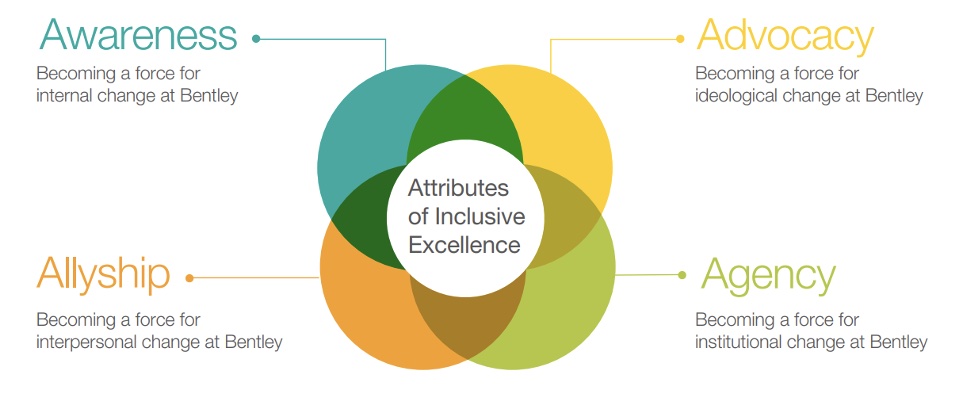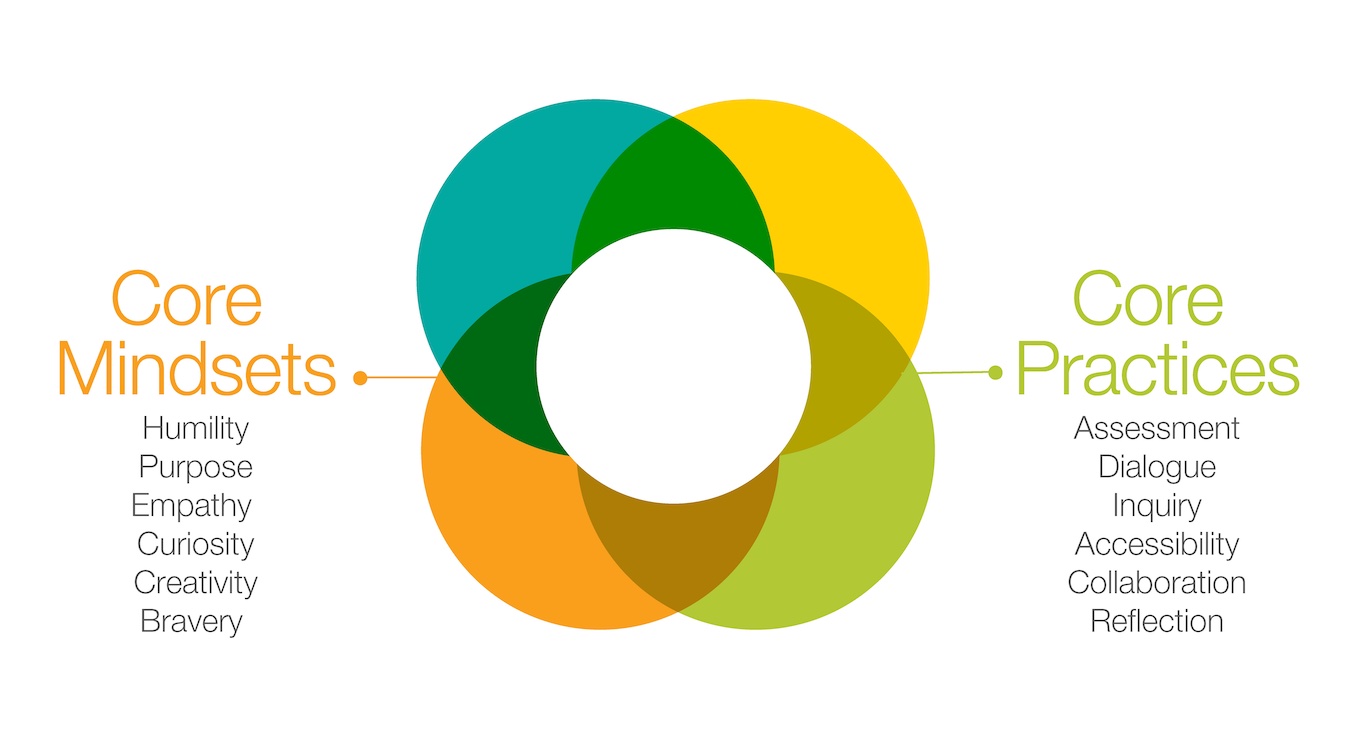We affirm identities, not just accept differences.
We seek to proactively change, not just react when needed.
We engage with our mistakes, not just acknowledge they are there.
We strive for justice, not just promote inclusion.
We build anti-oppression, not just celebrate diversity.
We challenge the status quo, not just accept the easy path.
We are a force for Inclusive Excellence.
Inclusive Excellence Learning & Development Model
The Office of Diversity & Inclusion is excited to announce the launch of the new Inclusive Excellence Learning & Development Model (IELDM). Bentley has made significant progress in our collective understanding of and commitment to diversity, equity, inclusion and justice. This new model harnesses the energy and passion so many of our community members have shown in engaging in opportunities to build our individual and collective capacity to create a more inclusive and equitable community. The IELDM provides a structure to guide your learning and identifies the outcomes you can work to develop along the way by outlining a set of core mindsets and practices with a scaling and development pathway to help faculty and staff easily build and grow our individual capacity for DEI.
Attributes of Inclusive Excellence
Learning and development focused on DEI at Bentley has been individually-focused and self-motivated. While several options for learning exist, little connection has existed between these opportunities and no expectations have been established to guide faculty and staff as they continue to grow their own understanding of DEI in practice.
This new model provides a scaling development path called the Attributes of Inclusive Excellence, where employees can start at Awareness before moving into Allyship, Advocacy and Agency. This path ensures faculty and staff can identify developmentally appropriate opportunities for their growth.

What are the Attributes of Inclusive Excellence?
Awareness
Striving to create an inclusive campus starts at awareness. We must recognize what our identities are, how those identities have affected our lived experiences and what other identities experience when navigating the world.
Allyship
Once we become aware, we must then learn to ally. Allyship, at its core, is how we react when discrimination happens in front of us and how we take responsibility when our actions cause harm. By reacting in these situations, we are better able to show our institution welcomes and affirms all individuals.
Advocacy
Beyond allyship is advocacy, the intentional and proactive work of centering the needs of historically minoritized communities and voices. By advocating, we begin to collectively create and maintain a culture which affirms and promotes the equitable achievement of all individuals.
Agency
Advocacy is furthered when it becomes institutional. This is where agency begins. Bentley is made better when systems are changed to remove barriers preventing the inclusion of, equitable participation by and advancement of all our community members. By implementing systemic changes, inclusion and justice, rather than simple diversity, is manifested.
Core Mindsets and Practices
The model offers a common set of Core Mindsets and Core Practices that facilitate DEI development and help guide employees as they more deeper into their development. These mindsets and practices will help faculty and staff prepare themselves to effectively engage with DEI in their roles and divisions and will be actively incorporated into ODI’s programming, both through explicit discussion or through incorporation into the program design.

What are the Core Mindsets?
Core Mindsets are mental preparations and foundations that dictate how we think and approach diversity, equity and inclusion work. They assist faculty and staff in doing the internal work that allows for more robust, holistic diversity, equity, inclusion and justice engagement.
Below are reflection question designed to help employees further their Core Mindset development.
Humility
Can we recognize when we are wrong or don’t know something?
Can we recognize that others bring important views and ideas to our group dynamics?
Can we recognize that dominant views, even ones we are not aware of, have influenced systems and policies?
Purpose
What drives and connects us to our work?
What brings us together to do this work collectively?
What do embedded, anti-oppression practices look like at Bentley?
Empathy
Can we feel with others, not just for them?
Are we able to create groups that center and address the impacts on historically minoritized groups?
Can we understand the difficulties others have in navigating systems not designed by or for them?
Curiosity
Do we have a drive to constantly learn more?
Do we have a drive to understand why our teams run and operate certain ways?
Do we have a drive to understand how our systems have been created by historical and modern practices?
Creativity
Can we imagine a different world?
Are we able to imagine new ways of doing things?
Can we envision what equity would look like in practice?
Bravery
Can we push past discomfort to engage in conversations around DEI?
Are we able to trust others to hold us up and accountable to this work?
Are we able to let go of how things have “always been” to do things a new way?
What are the Core Practices?
Core Practices are actionable steps and routines that influence how we operationalize and evaluate diversity, equity and inclusion work. They represent external tools faculty and staff can use and adapt as they engage DEI in their roles.
Below are reflection question designed to help employees further their Core Practice development.
Assessment
What questions are we asking ourselves to move our individual thinking towards equity-mindedness?
What data are we collecting to evaluate our past actions and inform our future practices?
How are we implementing changes based on data we have gathered?
Dialogue
Can we effectively communicate across identity, difference and lived experiences?
Do we approach these conversations with the desire for greater understanding?
How are we, as a university community, pushing us to listen to and learn from each other constantly?
Inquiry
Are we understanding how we can apply new learning to our current roles?
Do we look for patterns in our past successes and shortcomings to make decisions?
Are we able to ask ourselves who we balance appreciative and critical inquiry to move the work forward?
Accessibility
Are we proactively ensuring our actions create accessible paths toward equity?
Is the language we are using able to be understood by everyone, including those new to the work?
Are we preventing new roadblocks from arising as we create new initiatives for equity?
Collaboration
What relationships have we built that move the work forward?
Where have we fostered DEI collaboration where there has not been in the past?
What does collective responsibility for change look like at Bentley?
Reflection
What time do we take to reflect on our actions and identities?
Are we asking ourselves questions about how we show up in spaces, both good and bad?
Are we trying to understand how we could have done things differently?
Bentley Baseline
To ensure faculty and staff can readily and easily identify opportunities for DEI development, the Office of Diversity & Inclusion has created a new program called Bentley Baseline. Designed as a self-guided professional development series to be completed within the first two years of employment at Bentley, Baseline is the place to begin or continue professional development within DEI. To assist faculty and staff in planning their development, we have development a Bentley Baseline Roadmap, which assists faculty and staff in tracking their progress and reflecting on and planning for future development opportunities.
Bentley Baseline combines three Universal Experiences with a Personal Growth Plan each employee creates in consultation with their manager and division. This combination ensures each employee has the ability to customize their learning and growth to their particular job function and duties along with a baseline of knowledge and skills. It is also an excellent tool and opportunity for employees and managers to utilize when identifying Inclusive Excellence CAP goals.
Universal Experiences
The Universal Experiences are a set of three trainings designed and offered by the Office of Diversity & Inclusion. They are self-contained trainings that guide faculty and staff through reflection and action planning to develop a core set of knowledge for working at Bentley.
Personal Growth Plan
The Personal Growth Plan (PGP) is designed to help employees participate in activities that can enhance their personal passions or roles. The PGP is designed in collaboration with each employee’s office, division and manager.
The three Universal Experiences and examples of opportunities for the Personal Growth Plan are below.
Universal Experiences
Ally 101 Workshop
Anti-Racism 101 Workshop
Accessibility 101 Workshop
Personal Growth Plan
PGP Experiences can include, but are not limited to:
Trans Ally Workshop
Bentley Brave Activities/Dialogue Groups
Third Party Webinars or Trainings like LinkedIn Learning
Access the Bentley Baseline Planning Document
Bentley Forward
Bentley Forward is a new program designed to help faculty and staff who have been previously activated in engaging DEI in their roles. Forward takes learning beyond allyship and awareness and offers faculty and staff the chance to make tangible, systemic changes to how Bentley runs and operates. It is designed for individuals who have found a passion and dedication to diversity, equity, inclusion and justice and want to take further action in addressing inequities on Bentley's campus.
To ensure everyone can find new and fulfilling opportunities for growth and engagement, the Office of Diversity & Inclusion will be creating new programs through Bentley Forward. Two programs are currently available for faculty and staff to take part in through collaboration with the Office of Diversity & Inclusion.
Promoting Equity Together (P.E.T.) Projects
P.E.T. Projects are designed for faculty and staff to come together in a cross-divisional, collaborative team to advance changes or new initiatives at a systemic level. These projects offer faculty and staff with a particular passion area to utilize their own skills along with the expertise of other campus partners to enact ideological or institutional changes across campus. For more information about or to become involved in future P.E.T. Projects, contact Patrick Couillard Hale, Director for Diversity & Inclusion.
Racial Equity Working Groups
The BIPOC Solidarity and Whiteness Accountability Groups are affinity groups (or caucuses) for employees who wish to bravely and authentically engage with their experiences as racialized individuals. We recognize that in order to come together in cross-racial brave spaces as a community, sometimes we need to have opportunities to explore and find support in identity alike safe spaces. For more information about or to join a future REWG, contact Matthew Banks, Associate Director Diversity & Inclusion.

